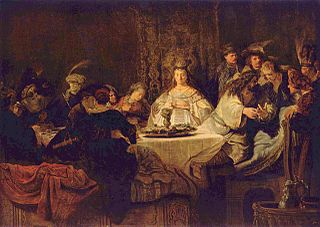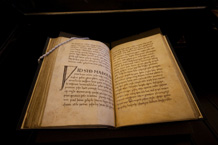Related Research Articles
Old English literature refers to poetry and prose written in Old English in early medieval England, from the 7th century to the decades after the Norman Conquest of 1066, a period often termed Anglo-Saxon England. The 7th-century work Cædmon's Hymn is often considered as the oldest surviving poem in English, as it appears in an 8th-century copy of Bede's text, the Ecclesiastical History of the English People. Poetry written in the mid 12th century represents some of the latest post-Norman examples of Old English. Adherence to the grammatical rules of Old English is largely inconsistent in 12th-century work, and by the 13th century the grammar and syntax of Old English had almost completely deteriorated, giving way to the much larger Middle English corpus of literature.
Old English, or Anglo-Saxon, is the earliest recorded form of the English language, spoken in England and southern and eastern Scotland in the early Middle Ages. It developed from the languages brought to Great Britain by Anglo-Saxon settlers in the mid-5th century, and the first Old English literary works date from the mid-7th century. After the Norman Conquest of 1066, English was replaced for several centuries by Anglo-Norman as the language of the upper classes. This is regarded as marking the end of the Old English era, since during the subsequent period the English language was heavily influenced by Anglo-Norman, developing into what is now known as Middle English in England and Early Scots in Scotland.

Cædmon is the earliest English poet whose name is known. A Northumbrian cowherd who cared for the animals at the double monastery of Streonæshalch during the abbacy of St. Hilda, he was originally ignorant of "the art of song" but learned to compose one night in the course of a dream, according to the 8th-century historian Bede. He later became a zealous monk and an accomplished and inspirational Christian poet.

A riddle is a statement, question or phrase having a double or veiled meaning, put forth as a puzzle to be solved. Riddles are of two types: enigmas, which are problems generally expressed in metaphorical or allegorical language that require ingenuity and careful thinking for their solution, and conundra, which are questions relying for their effects on punning in either the question or the answer.
The Old English Bible translations are the partial translations of the Bible prepared in medieval England into the Old English language. The translations are from Latin texts, not the original languages.
Cynewulf is one of twelve Old English poets known by name, and one of four whose work is known to survive today. He presumably flourished in the 9th century, with possible dates extending into the late 8th and early 10th centuries.

The Exeter Book, also known as the Codex Exoniensis or Exeter Cathedral Library MS 3501, is a large codex of Old English poetry, believed to have been produced in the late tenth century AD. It is one of the four major manuscripts of Old English poetry, along with the Vercelli Book in Vercelli, Italy, the Nowell Codex in the British Library, and the Junius manuscript in the Bodleian Library in Oxford. The book was donated to what is now the Exeter Cathedral library by Leofric, the first bishop of Exeter, in 1072. It is believed originally to have contained 130 or 131 leaves, of which the first 7 or 8 have been replaced with other leaves; the original first 8 leaves are lost. The Exeter Book is the largest and perhaps oldest known manuscript of Old English literature, containing about a sixth of the Old English poetry that has survived.
Northumbrian was a dialect of Old English spoken in the Anglian Kingdom of Northumbria. Together with Mercian, Kentish and West Saxon, it forms one of the sub-categories of Old English devised and employed by modern scholars.

The Lacnunga ('Remedies') is a collection of miscellaneous Anglo-Saxon medical texts and prayers, written mainly in Old English and Latin. The title Lacnunga, an Old English word meaning 'remedies', is not in the manuscript: it was given to the collection by its first editor, Oswald Cockayne, in the nineteenth century. It is found, following other medical texts, in London, British Library Harley MS 585, a codex probably compiled in England in the late tenth or early eleventh century. Many of its herbal remedies are also found, in variant form, in Bald's Leechbook, another Anglo-Saxon medical compendium.

Cædmon's Hymn is a short Old English poem attributed to Cædmon, a supposedly illiterate and unmusical cow-herder who was, according to the Northumbrian monk Bede, miraculously empowered to sing in honour of God the Creator. The poem is Cædmon's only known composition.

Anglo-Saxon riddles are a significant genre of Anglo-Saxon literature. The riddle was a major, prestigious literary form in early medieval England, and riddles were written both in Latin and Old English verse. The pre-eminent composer of Latin riddles in early medieval England was Aldhelm, while the Old English verse riddles found in the tenth-century Exeter Book include some of the most famous Old English poems.
The Lorsch riddles, also known as the Aenigmata Anglica, are a collection of twelve hexametrical, early medieval Latin riddles that were anonymously written in the ninth century.
Exeter Book Riddle 83 is one of the Old English riddles found in the later tenth-century Exeter Book. Its interpretation has occasioned a range of scholarly investigations, but it is taken to mean 'Ore/Gold/Metal', with most commentators preferring 'precious metal' or 'gold', and John D. Niles arguing specifically for the Old English solution ōra, meaning both 'ore' and 'a kind of silver coin'.
Exeter Book Riddle 60 is one of the Old English riddles found in the later tenth-century Exeter Book. The riddle is usually solved as 'reed pen', although such pens were not in use in Anglo-Saxon times, rather being Roman technology; but it can also be understood as 'reed pipe'.
De creatura is an 83-line Latin polystichic poem by the seventh- to eighth-century Anglo-Saxon poet Aldhelm and an important text among Anglo-Saxon riddles. The poem seeks to express the wondrous diversity of creation, usually by drawing vivid contrasts between different natural phenomena, one of which is usually physically higher and more magnificent, and one of which is usually physically lower and more mundane.

The Exeter Book riddles are a fragmentary collection of verse riddles in Old English found in the later tenth-century anthology of Old English poetry known as the Exeter Book. Today standing at around ninety-four, the Exeter Book riddles account for almost all the riddles attested in Old English, and a major component of the otherwise mostly Latin corpus of riddles from early medieval England.
Durham, also known as De situ Dunelmi, Carmen de situ Dunelmi or De situ Dunelmi et de sanctorum reliquiis quae ibidem continentur carmen compositum, is an anonymous late Old English short poem about the English city of Durham and its relics, which might commemorate the translation of Cuthbert's relics to Durham Cathedral in 1104. Known from the late 12th-century manuscript, Cambridge, University Library, Ff. 1. 27, Durham has been described both as "the last extant poem written in traditional alliterative Old English metrical verse" and as being placed "so conveniently on the customary divide between Old and Middle English that the line can be drawn right down the middle of the poem." Scholars have dated the poem either to the twelfth century or to some point in the second half of the eleventh century.

The writing-riddle is an international riddle type, attested across Europe and Asia. Its most basic form was defined by Antti Aarne as 'white field, black seeds', where the field is a page and the seeds are letters. However, this form admits of variations very diverse in length and degree of detail. For example, a version from Astrakhan translates as "the enclosure is white, the sheep are black", while one from the Don Kalmyks appears as "a black dog runs on white snow", and literary riddlers especially have produced long variations on the theme, often overlapping with riddles on pens and other writing equipment.
Exeter Book Riddle 65 is one of the Old English riddles found in the later tenth-century Exeter Book. Suggested solutions have included Onion, Leek, and Chives, but the consensus is that the solution is Onion.

The Epistola ad Acircium, sive Liber de septenario, et de metris, aenigmatibus ac pedum regulis is a Latin treatise by the West-Saxon scholar Aldhelm. It is dedicated to one Acircius, understood to be King Aldfrith of Northumbria. It was a seminal text in the development of riddles as a literary form in medieval England.
References
- ↑ Fr. Glorie (ed.), Variae collectiones aenignmatvm Merovingicae aetatis (pars altera), Corpvs Christianorvm, Series Latina, 133a (Turnholt: Brepols, 1968), p. 417 (Riddle 33).
- ↑ M. B. Parkes, ‘The Manuscript of the Leiden Riddle’, Anglo-Saxon England, 1 (1972), 207–17 (p. 208); doi : 10.1017/S0263675100000168. Length-marks added to Parkes's transcription on the basis of John R. Clark Hall, A Concise Anglo-Saxon Dictionary, 4th rev. edn by Herbet D. Meritt (Cambridge: Cambridge University Press, 1960).
- ↑ C. Williamson (ed.), The Old English Riddles of the Exeter Book (Chapel Hill, 1977), pp. 88-89 (Riddle 33). Length-marks added to Williamson's edition on the basis of John R. Clark Hall, A Concise Anglo-Saxon Dictionary, 4th rev. edn by Herbet D. Meritt (Cambridge: Cambridge University Press, 1960).
- ↑ Thomas Klein, ‘The Old English Translation of Aldhelm’s Riddle Lorica’, The Review of English Studies, n. s., 48 (1997), 345–49 (p. 345).
- ↑ Richard Dance, 'The Old English Language and the Alliterative Tradition', in A Companion to Medieval Poetry, ed. by Corinne Saunders (Chichester: Wiley-Blackwell, 2010), pp. 34-50 (pp. 40-41).
- ↑ Richard Dance, 'The Old English Language and the Alliterative Tradition', in A Companion to Medieval Poetry, ed. by Corinne Saunders (Chichester: Wiley-Blackwell, 2010), pp. 34-50 (pp. 40-41).
- ↑ Meritt, Herbert Dean (ed.), Old English Glosses: A Collection, The Modern Language Association of America, General Series, 16 (London, 1945), pp. xvii-xviii.
- ↑ M. B. Parkes, ‘The Manuscript of the Leiden Riddle’, Anglo-Saxon England, 1 (1972), 207–17 (pp. 210-17); doi : 10.1017/S0263675100000168.
- ↑ Alaric Hall, Elves in Anglo-Saxon England: Matters of Belief, Health, Gender and Identity, Anglo-Saxon Studies, 8 (Woodbridge: Boydell, 2007), p. 79.
- ↑ Thomas Klein, ‘The Old English Translation of Aldhelm’s Riddle Lorica’, The Review of English Studies, n. s., 48 (1997), 345–49 (p. 345).
- ↑ Thomas Klein, ‘The Old English Translation of Aldhelm’s Riddle Lorica’, The Review of English Studies, n. s., 48 (1997), 345–49 (p. 349).
- ↑ Richard Dance, 'The Old English Language and the Alliterative Tradition', in A Companion to Medieval Poetry, ed. by Corinne Saunders (Chichester: Wiley-Blackwell, 2010), pp. 34-50 (p. 41).